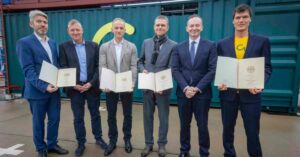
Two Ships Changed Course In Red Sea & Gulf of Aden After Houthis’ Vessel Hijack
November 22, 2023
U.S & the Philippines Begin Joint Patrols In The South China Sea Alarming China
November 22, 2023
The pilot plant was reportedly launched on 20 November as part of the Leuna100 assignment inaugurated at the Leuna Chemical Park in August this year and is all set to run for the next three years.
It is currently being funded with a whopping €10.4 million by the German Federal Ministry for Digital and Transport (abbreviated the BMDV) as a part of the Renewable Fuels Funding Program.

Fraunhofer Institute for Wind Energy Systems IWES, C1 Green Chemicals, Fraunhofer Institute for Environmental, Safety, and Energy Technology UMSICHT, the DBI – Gastechnologisches Institut GmbH Freiberg (better-known as DBI-GTI), along with the Technical University of Berlin make up the project consortium.
The aim is to use a new production procedure to facilitate the cost-efficient market ramp-up of green methanol and offer a climate-neutral advanced alternative fuel to the container shipping industry.
The Leuna100 project reportedly encompasses green methanol production in three steps: methanol production, synthesis gas production, and purification of crude methanol.
For this project, C1 developed a technology that facilitates efficient low-temp- and low-pressure-based methanol generation.
Besides, two different technologies combined for the CO2-oriented production of synthesis gas have also been employed. Fraunhofer UMSICHT offers low-temp co-electrolysis, whereas DBI – Gastechnologisches Institut gGmbH Freiberg uses a reverse water gas shift (abbreviated RWGS) unit.
C1 has been delivering the catalyst and a reactor made in-house to enable the catalysis of methanol. Now, Fraunhofer IWES has been offering the location and infrastructure at Hydrogen Lab Leuna and evaluating the load flexibility.
TU Berlin has started developing an efficient, load-flexible operating notion based on a dynamic process model.
Reference- Offshore energy
World’s 1st Cost-effective Green Methanol Pilot Plant Inaugurated In Leuna Chemical Park, Germany appeared first on Marine Insight – The Maritime Industry Guide
Source: Maritime Shipping News


